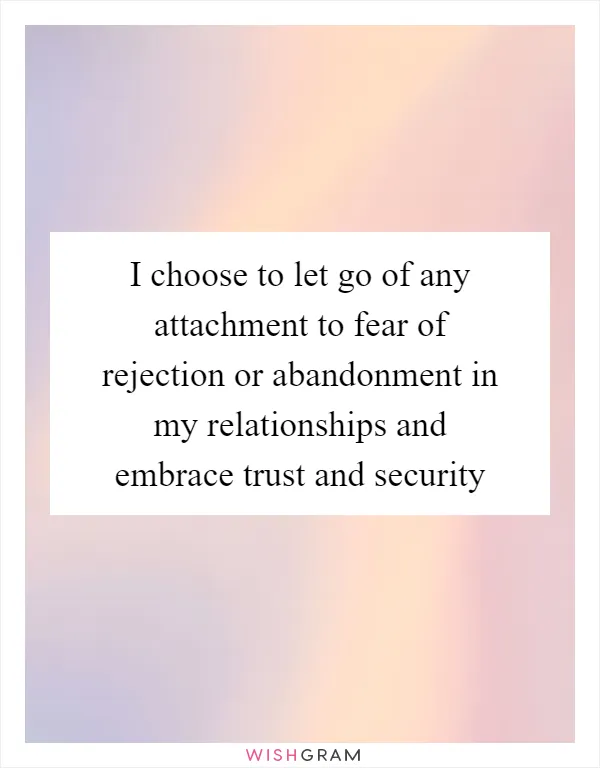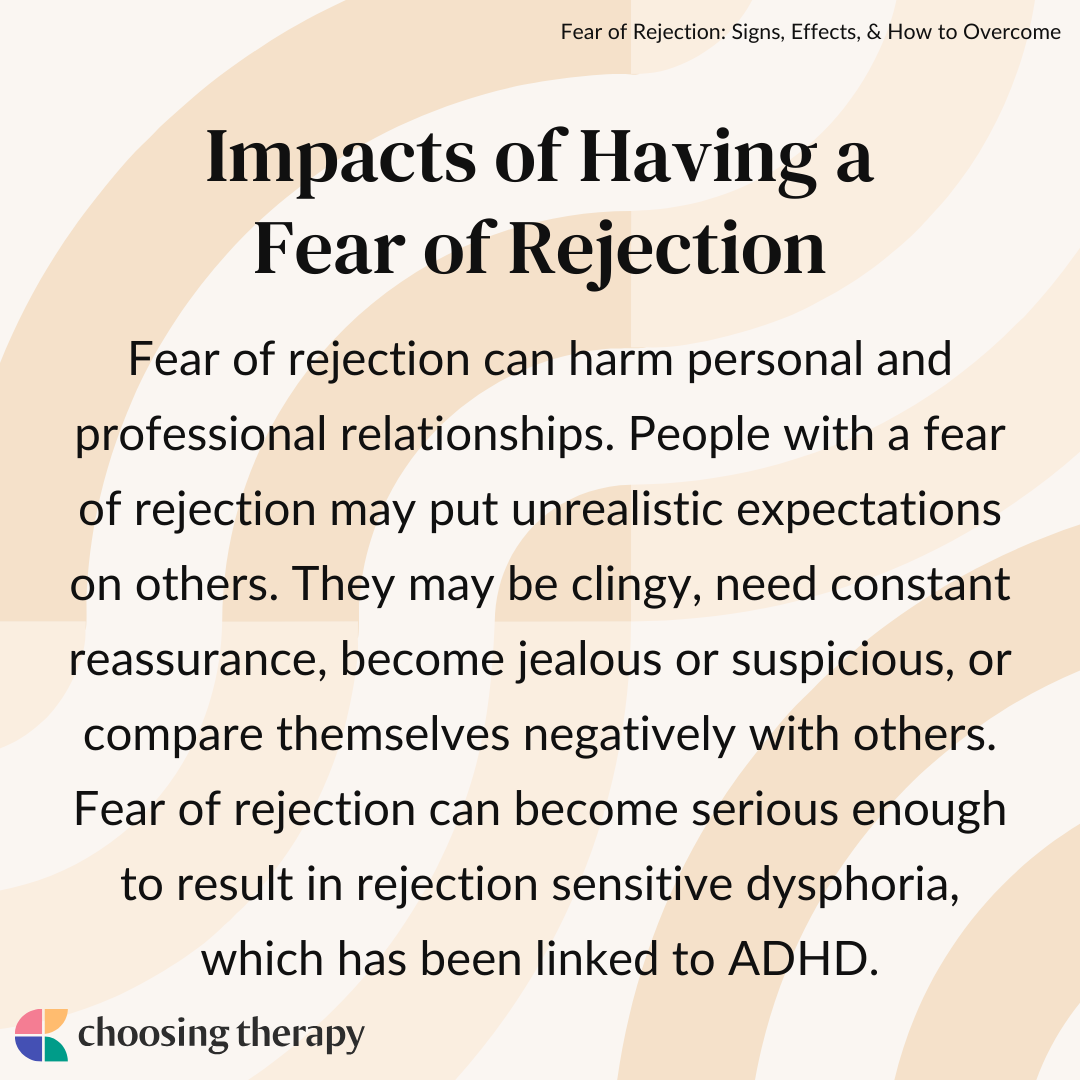Letting go of the fear of rejection in new relationships can be challenging. Fear often holds us back and keeps us from experiencing true connections. Starting a new relationship can be both exciting and scary. Fear of rejection can make it hard to open up. It’s normal to feel this way. Many people struggle with these feelings. This fear can prevent us from showing our true selves.
It can also keep us from forming deep bonds. Learning to let go of this fear can help us build stronger, more meaningful relationships. In this post, we will explore ways to overcome this fear. By addressing these feelings, you can enjoy new relationships without the constant worry of being rejected.
Embracing Vulnerability
Embracing vulnerability in new relationships can be challenging. Vulnerability means showing your true self, even the parts you usually hide. This openness can lead to deeper connections. Still, the fear of rejection often holds people back. Letting go of this fear begins with accepting your imperfections and building emotional resilience.
Accepting Imperfections
No one is perfect. Everyone has flaws. Accepting your imperfections is key to embracing vulnerability. Start by acknowledging your shortcomings. Understand that they make you human. They do not define your worth.
Share your true self with your partner. Open up about your insecurities. This honesty can strengthen your bond. It shows you trust them. It also encourages them to be open with you.
Remember, a healthy relationship is built on mutual understanding. Both partners should accept each other’s flaws. Celebrate your unique qualities together. This mutual acceptance reduces the fear of rejection.
Building Emotional Resilience
Emotional resilience helps you cope with rejection. It is the ability to recover from setbacks. Start by recognizing your emotions. Allow yourself to feel them. Do not suppress your feelings.
Practice self-compassion. Be kind to yourself. Remember, everyone faces rejection at times. It is a normal part of life. Learn from these experiences. They can make you stronger.
Engage in activities that boost your confidence. Pursue hobbies that you enjoy. Spend time with supportive friends and family. Building a strong support system helps you bounce back from rejection.
Focus on personal growth. Work on improving yourself. This boosts your self-esteem. It also makes you less fearful of rejection. A confident person can handle rejection better. They see it as a part of life, not a reflection of their worth.

Understanding Fear Of Rejection
Understanding the fear of rejection is key to building healthy relationships. This fear often stems from deep-seated psychological roots and is triggered by various situations. By identifying these aspects, you can better manage and eventually overcome this fear.
Psychological Roots
The fear of rejection often starts in childhood. Experiences of neglect or criticism can plant the seeds of this fear. As you grow older, these early experiences shape your self-esteem and self-worth. You may start believing that rejection reflects your value as a person. This belief can make you overly cautious in new relationships.
Anxiety and depression can also contribute to the fear of rejection. These mental health issues make you more sensitive to social cues. As a result, you might perceive rejection even when it isn’t there. Understanding these psychological roots helps you address the underlying causes of your fear.
Common Triggers
Certain situations are more likely to trigger the fear of rejection. Meeting new people is a common trigger. The uncertainty of how they will perceive you can be daunting. Social settings where you feel judged or evaluated can also heighten this fear.
Another common trigger is past experiences of rejection. If you’ve been rejected before, you might expect it to happen again. This expectation can create a self-fulfilling prophecy. By identifying these triggers, you can prepare yourself to handle them better.
Building Self-confidence
Building self-confidence is key to overcoming the fear of rejection in new relationships. When you feel confident, you trust yourself more and worry less about others’ opinions. Confidence helps you stay positive and handle rejection better.
Positive Self-talk
Positive self-talk boosts your confidence. Replace negative thoughts with encouraging ones. Instead of thinking, “They won’t like me,” say, “I am worth knowing.” Remind yourself of your strengths and achievements. Write down positive affirmations and read them daily. This practice can shift your mindset over time.
Setting Personal Boundaries
Setting personal boundaries is essential for self-confidence. Boundaries help you respect yourself and others. They show you value your own needs and limits. Communicate your boundaries clearly in new relationships. Don’t be afraid to say “no” when necessary. Respecting your boundaries builds self-respect and confidence.
Effective Communication
Effective communication is essential to overcoming the fear of rejection in new relationships. Clear and honest dialogue helps build trust, making you feel more secure. Both partners must express their feelings and listen actively to understand each other. This section will guide you on how to do that effectively.
Expressing Feelings Openly
Start by sharing your feelings without fear. Use “I” statements to express your thoughts and emotions. For example:
- I feel anxious when we don’t talk for days.
- I need reassurance that you care about me.
Be honest and transparent. This helps your partner understand your perspective. Don’t hide your emotions. It leads to misunderstandings and hurt feelings. If you feel scared, say so. If you’re happy, share it. Honest communication fosters a deeper connection.
Listening Actively
Active listening is more than just hearing words. It’s about understanding the message. Show you are engaged:
- Nod and maintain eye contact.
- Repeat back what you’ve heard to confirm understanding.
Ask open-ended questions to encourage your partner to share more. For instance:
- Can you tell me more about your day?
- How did that make you feel?
Don’t interrupt while your partner speaks. This shows respect and value for their words. Active listening builds trust and reduces the fear of rejection.
Setting Realistic Expectations
Setting realistic expectations is vital to overcoming the fear of rejection in new relationships. It helps you stay grounded and manage your emotions better. By focusing on what’s real and achievable, you can avoid unnecessary heartbreak and anxiety. Let’s explore how to set realistic expectations in your budding relationship.
Avoiding Unrealistic Ideals
Many people enter new relationships with high hopes and idealistic views. They imagine a perfect partner who meets all their needs. This mindset sets you up for disappointment. No one is perfect. Everyone has flaws and shortcomings.
Instead of looking for perfection, focus on shared values and goals. Acknowledge that your partner is human. They will make mistakes. Accepting this can lead to a healthier relationship. It also reduces the fear of rejection. You won’t be as surprised or hurt by imperfections.
Practicing Patience
New relationships take time to develop. Rushing things can create pressure and anxiety. Patience is key to building a strong foundation. Allow the relationship to grow at its own pace.
Give yourself and your partner time to adjust. Understand that not everything will be perfect right away. This patience helps you manage expectations better. It also helps you see the relationship more clearly.
Practicing patience can ease the fear of rejection. You won’t feel the need to force things. Instead, you can enjoy the journey of getting to know each other.

Practicing Mindfulness
Mindfulness can be a powerful tool to let go of the fear of rejection in new relationships. It helps you stay aware of your thoughts and feelings without being overwhelmed by them. By practicing mindfulness, you can learn to accept your emotions and reduce anxiety. Here are some ways to incorporate mindfulness into your daily routine to help manage the fear of rejection.
Staying Present
One of the key aspects of mindfulness is staying present. This means focusing on the current moment instead of worrying about the past or future. Here are some techniques to help you stay present:
- Deep Breathing: Take slow, deep breaths to calm your mind.
- Body Scan: Pay attention to different parts of your body and release tension.
- Five Senses: Notice what you see, hear, smell, taste, and touch around you.
Practicing these techniques can help you stay grounded and reduce the fear of rejection.
Managing Anxiety
Mindfulness can also help you manage anxiety, which often comes with the fear of rejection. Here are some ways to use mindfulness to manage anxiety:
- Acceptance: Accept your feelings without judgment.
- Observe Thoughts: Notice your thoughts without getting caught up in them.
- Mindful Meditation: Spend a few minutes each day meditating to clear your mind.
By practicing mindfulness, you can learn to manage your anxiety and reduce the fear of rejection in new relationships.
Seeking Professional Help
Facing the fear of rejection in new relationships can be overwhelming. Sometimes, self-help strategies alone may not be enough. This is where seeking professional help can make a significant difference. Professional guidance can provide tailored support and effective strategies to manage these fears. Below are some options to consider.
Therapy Options
Therapists can offer various approaches to help you deal with fear of rejection. Here are some common types:
- Cognitive Behavioral Therapy (CBT): This therapy helps change negative thought patterns.
- Psychodynamic Therapy: Focuses on understanding the root causes of your fears.
- Exposure Therapy: Gradually exposes you to rejection scenarios in a controlled way.
Each type of therapy has its own benefits. A therapist can help you find the right fit for your needs.
Support Groups
Joining a support group can provide a sense of community and shared experiences. These groups can offer:
| Type of Support Group | Benefits |
|---|---|
| Online Forums | Access support from the comfort of your home. |
| Local Meetups | Face-to-face interaction with people who understand your fears. |
| Specialized Groups | Focus on specific issues like dating anxiety or social fears. |
Support groups can help you feel less alone. They offer practical advice and emotional support.
Building A Support Network
Building a support network is crucial in overcoming the fear of rejection in new relationships. A strong support network provides emotional safety and reassurance. With the right people by your side, you can face your fears and grow more confident. This section will cover how to rely on friends and family and find community support.
Relying On Friends And Family
Friends and family can offer a safe space. They listen to your worries and give advice. Sharing your fears with loved ones helps you feel less alone. They remind you of your worth and strengths. Their support can boost your confidence in new relationships.
Spending time with friends and family can also reduce stress. Engage in fun activities together. These moments create positive memories and strengthen your bond. A strong bond with loved ones helps you feel secure and valued.
Finding Community Support
Community support groups can be very helpful. These groups consist of people facing similar fears. Sharing experiences with them can be comforting. You learn that others have the same struggles. This reduces feelings of isolation and builds empathy.
Joining interest-based groups is another option. This can be a book club, sports team, or hobby class. Connecting with others who share your interests can build new friendships. These friendships provide additional support and increase your social confidence.
Conclusion
Letting go of the fear of rejection takes time and effort. Stay patient. Focus on building self-confidence and understanding your worth. Practice open communication in relationships. This helps build trust. Seek support from friends or a therapist if needed. Remember, everyone experiences rejection at some point.
It’s a natural part of life. Embrace each experience as a chance to grow. Don’t let fear hold you back. Take small steps towards building healthier relationships. You deserve love and happiness.
